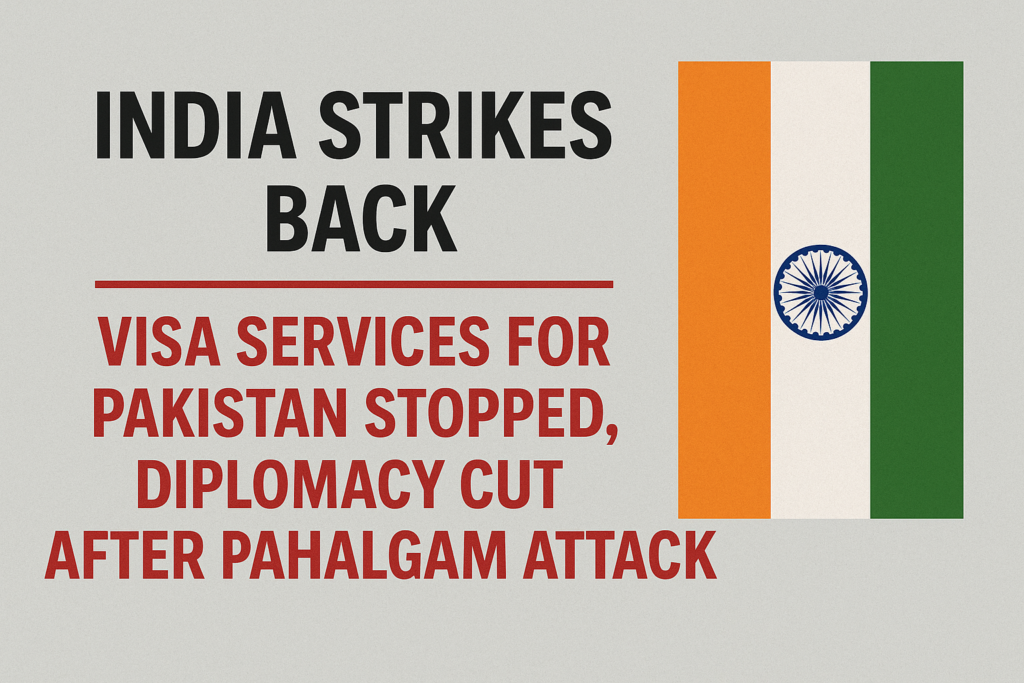Introduction
The Indian government made a firm retaliatory action against the Pahalgam terror attack by halting visa services for Pakistani nationals and reducing diplomatic relations between the two countries. The move was made after an attack in Jammu and Kashmir’s Pahalgam area, which is blamed by security officials on Pakistan-based terror groups.
This is one of India’s strongest reactions to cross-border terrorism in years, reflecting a tougher line on Pakistan’s reported sponsorship of militant activity. The action has attracted both local and overseas backing, sparking speculation regarding the future of Indian-Pakistani relations.
The Pahalgam Attack: What Happened?
On [insert date], militants in large numbers carried out a blatant attack in Pahalgam, one of the Jammu and Kashmir state’s top tourist spots. The attack was aimed at security personnel and civilians, killing [number] and injuring several others. Preliminary investigations point to the hand of Lashkar-e-Taiba (LeT) or Jaish-e-Mohammed (JeM), both organizations known to have connections with Pakistan’s Inter-Services Intelligence (ISI).
The area, which is famous for its natural scenery and places of pilgrimage, was rocked by the bloodshed, leading to instant security deployment and an outraged reaction across the country. The Indian government, headed by Prime Minister Narendra Modi, assured severe action, leading up to the announcement today of visa denials and diplomatic measures.
India’s Retaliation: Suspending Visa Services & Diplomatic Downgrade
1. Visa Services for Pakistanis Suspended
The Ministry of Home Affairs (MHA) ordered a halt to all visa services for Pakistani nationals, including:
Tourist visas
Business visas
Medical visas (with occasional exceptions)
Diplomatic visas (to be further screened)
The action effectively ends most civilian travel between the two nations, affecting families separated by the border, students, and business travelers. The government said it was to address security concerns and ensure that militants do not enter under the guise of legitimate travel.
2. Downgrading Diplomatic Relations
India has also resolved to downsize its diplomatic representation in Pakistan, withdrawing important officials and restricting interaction. Actions include:
India’s Deputy High Commissioner recalled from Islamabad
Tighter checks on Pakistani diplomats in India
Staff cut at the Indian High Commission in Pakistan
This comes after years of tense relations, including the 2019 Pulwama attack, following which India removed Pakistan’s Most Favored Nation (MFN) status and imposed stiff trade restrictions.
Why This Move Matters
1. A Strong Message Against Terrorism
India’s move conveys a strong message that it will no longer accept Pakistan’s so-called state-sponsored terrorism. By suspending visas and lowering diplomatic relations, New Delhi is trying to isolate Pakistan globally and push it to act against terror outfits.
2. Impact on Cross-Border Families & Trade
The visa suspension will heavily impact:
Families with members on both sides (particularly in Punjab and Kashmir)
Patients coming to India for medical treatment
Companies involved in limited trade
But the government has said that national security is more important than these issues.
3. Global Reactions
The international community is observing India’s action closely. While Western countries have criticized the Pahalgam attack, they can call for de-escalation. China, Pakistan’s ally, might be against India’s action, while Gulf countries might remain neutral.
Pakistan’s Likely Response
Pakistan has dismissed accusation of involvement in the Pahalgam attack, labeling India’s move “unilateral and aggressive.” Responses could be:
Retaliatory Visa Restrictions against Indians
Higher rhetoric at UN
Rallying allies like China for support
In the event Pakistan continues to allow terror, India would look to apply additional economic as well as military steps, which include:
Higher trade bans
More border shelling
Cyber warfare & intelligence activities
Historical Background: India-Pakistan Relations & Terrorism
India and Pakistan have a history of confrontation with terrorism being one of the key flashpoints:
2001 Parliament Attack – India deployed troops (Operation Parakram)
2008 Mumbai Attacks – Resulted in freeze in peace talks
2016 Uri Attack – India retaliated with surgical strikes
2019 Pulwama Attack – After Balakot airstrike
Every escalation has involved India clamping down on visa restrictions, downscaling diplomacy, or taking military action. The current step follows the pattern but is harsher on the diplomatic side.
Indian & Political Responses in India
1. Ruling Party & Government’s Position
The BJP government has justified the move, terming it crucial for national security. Home Minister Amit Shah said: “We will not tolerate terrorism, and Pakistan must pay the price for its actions.”
2. Opposition’s Reaction
Though some opposition parties (such as the Congress) have welcomed the step, others call for even more drastic measures, including total diplomatic isolation.
3. Public Opinion
Most Indians, particularly in Jammu & Kashmir, have greeted the decision as a long-awaited measure against Pakistan’s suspected terror support.
What’s Next? Possible Scenarios
1. Escalation (If Pakistan Doesn’t Act Against Militants)
More Indian military attacks
Total diplomatic shutdown
UN sanctions push against Pakistan.
2. De-escalation (If Pakistan Cracks Down on Terror Groups)
Gradual resumption of visas
Dialogue resumption (unlikely in the near term)
3. Status Quo (Continued Stalemate)
No major war, but no peace either
Low-level skirmishes continue
Conclusion: A Defining Moment in India-Pakistan Ties
India’s move to suspend visas and downgrade diplomacy represents a new era in its Pakistan policy—one in which tolerance for terrorism is zero. Although the step poses the risk of humanitarian fallout, the government feels that it is needed to compel Pakistan’s hand against terror.
The next few weeks will tell us if Pakistan opts to act against militants or remains isolated further. For now, India has made a red line—and the world is watching.
Final Thoughts
This dramatic step may drive Pakistan toward counterterrorism measures or exacerbate tensions between the two nuclear-armed rivals. This much is certain: India is no longer content with half-steps when it comes to security.

